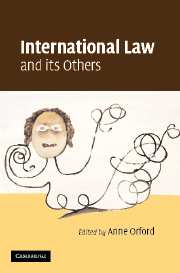Book contents
- Frontmatter
- Contents
- Acknowledgments
- Notes on the contributors
- 1 A jurisprudence of the limit
- PART I Sovereignty otherwise
- PART II Human rights and other values
- PART III The relation to the other
- 10 Completing civilization: Creole consciousness and international law in nineteenth-century Latin America
- 11 From ‘savages’ to ‘unlawful combatants’: a postcolonial look at international humanitarian law's ‘other’
- 12 Lost in translation: re-scripting the sexed subjects of international human rights law
- 13 Flesh made law: the economics of female genital mutilation legislation
- PART IV History's other actors
- Index
10 - Completing civilization: Creole consciousness and international law in nineteenth-century Latin America
Published online by Cambridge University Press: 20 July 2009
- Frontmatter
- Contents
- Acknowledgments
- Notes on the contributors
- 1 A jurisprudence of the limit
- PART I Sovereignty otherwise
- PART II Human rights and other values
- PART III The relation to the other
- 10 Completing civilization: Creole consciousness and international law in nineteenth-century Latin America
- 11 From ‘savages’ to ‘unlawful combatants’: a postcolonial look at international humanitarian law's ‘other’
- 12 Lost in translation: re-scripting the sexed subjects of international human rights law
- 13 Flesh made law: the economics of female genital mutilation legislation
- PART IV History's other actors
- Index
Summary
Contemporary studies of international law have revealed the connection between the discipline's civilizing discourse and its parallel expansion. However, they have studied the concept of civilization mainly in relation to the European colonization of Africa, Asia and the Pacific. This chapter hopes to add to the discussion by examining postcolonial Latin America, where ideas of civilization were central to the new nations' emergence as participants in, and contributors to, international law.
The word ‘civilization’ only came into use in the mid-eighteenth century and was quickly popularized during the French Revolution. The French term civilisation expressed the idea of progress and the perfectibility of humanity as a universal fact and, with it, the trust that law and institutions would be able to mould the human character. Civilisation was understood as a collective achievement of the human race, while at the same time the plural form – civilizations – signified the existence of various social groups in development, whose unity and perfection were synthesized only in European civilization. The idea of civilization – progress – had Europe as its frame of reference, and barbarism, its opposite, as outside of Europe. By the end of the eighteenth-century, as Norbert Elias describes in a key work on the subject, civilization had become the expression of national self-consciousness, and opened the doors for nineteenth-century European conquest and colonization of other regions – Europe believed itself to have ‘an existing or finished civilization’, a civilization in expansion.
- Type
- Chapter
- Information
- International Law and its Others , pp. 247 - 264Publisher: Cambridge University PressPrint publication year: 2006
- 12
- Cited by

